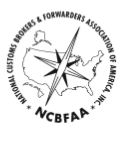
Resource Center
W
W. & I.: Weighing and Inspection
W.A.: With Average
w.g.: Weight guaranteed
W.P.A.: With Particular Average
W.R.: War Risk
W/M: Weight and/or measurement
W/R: Warehouse receipt
War Risk Insurance: Insurance issued by marine underwriters against war-like operations specifically described in the policy. In former times, war risk insurance was taken out only in times of war, but currently many exporter cover most of their shipments with war risk insurance as a protection against losses from derelict torpedoes and floating mines placed during former wars, and also as a safeguard against unforeseen warlike developments. In the United states, war risk insurance is written in a separate policy from the ordinary marine insurance; it is desirable to take out both policies with the same underwriter in order to avoid the ill effects of a possible dispute between underwriters as to the cause (marine peril or war peril) of a given loss.
War Risk: The possible aggressive actions against a ship and its cargo by a belligerent government. This risk can be insured by a marine policy with a risk clause.
Warehouse Receipt: A receipt of commodities deposited in a warehouse, identifying the commodities deposited. It is non-negotiable if permitting delivery only to a specified person or firm, but it is negotiable if made out to the order of a person or firm or to a bearer. Endorsement (without endorsement if made out to bearer) and delivery of a negotiable warehouse receipt serves to transfer the property covered by the receipt serves to transfer the property covered by the receipt. Warehouse receipts are common documents in international banking.
Warehouse-to-Warehouse: A clause in marine insurance policy whereby the underwriter agrees to cover the goods while in transit between the initial point of shipment and the point of destination, with certain limitations, and also subject to the law of insurable interest. When it was first introduced, the warehouse-to-warehouse clause was extremely important, but now its importance is diminished by the marine extension clauses, which override its provisions.
Web Lashing: Webbing made of artificial fibre which is tightened and locked with a winch.
Weight Load Factor: Payload achieved as against available, expressed as a percentage. Cargo is frequently limited by volume rather than weight; load factors of 100% are rarely achieved.
Weight, Legal: Net weight of goods, plus inside packing.
Weight:
- Gross - The weight of the goods including packing, wrappers, or containers, internal and external. The total weight as shipped.
- Net - The weight of the goods themselves without the inclusion of any wrapper.
- Tare - The weight of the packaging or container.
- Weight/Measurement Ton - In many cases, a rate is shown per weight/measurement ton, carrier's option. This means that the rate will be assessed on either a weight ton or measurement ton basis, whichever will yield the carrier the greater revenue. As example, the rate may be quoted on the basis of 2,240 pounds or 40 cubic feet or of 1 metric ton or 1 cubic meter.
- Weight Ton - There are three types of weight ton; the short ton, weighing 2,000 pounds; the long ton, weighing 2,240 pounds; and the metric ton weight 2,204.68 pounds. The last is frequently quoted for cargo being exported from Europe.
Wharfage: A charge assessed by a pier or dock owner against the cargo or a steamship company for use of the pier or dock.
With Average: A marine insurance term meaning that shipment is protected for partial damage whenever the damage exceeds a stated percentage.
With Particular Average (W.P.A.): An insurance term meaning that partial loss or damage of goods is insured. Generally must be caused by sea water. Many have a minimum percentage of damage before payment. May be extended to cover loss by theft, pilferage, delivery, leakage, and breakage.
Without Reserve: A term indicating shipper's agent or representative is empowered to make definitive decisions and adjustments abroad without approval of the group or individual represented. See advisory capacity.
World Bank: International bank for reconstruction and development






